 1 citations,
February 2021 in “Animal feed science and technology”
1 citations,
February 2021 in “Animal feed science and technology” Organic selenium may offer better retention and less waste in puppies.
 1 citations,
June 2001 in “Annals of Internal Medicine”
1 citations,
June 2001 in “Annals of Internal Medicine” The conclusion is that maintaining blinding in clinical trials is crucial for reliable results.

Monocyclic aromatic compounds are important for developing various drugs and treatments.

The Chromolaena odorata patch significantly speeds up wound healing.
 March 2022 in “International Journal of Current Science Research and Review”
March 2022 in “International Journal of Current Science Research and Review” Chronic ketosis in cows causes appetite changes, anemia, skin issues, increased pulse, and biochemical imbalances.
 May 2021 in “Journal of the Endocrine Society”
May 2021 in “Journal of the Endocrine Society” A patient produced cortisol after adrenalectomy, possibly due to residual tissue or other body parts making steroids.
 November 2020 in “Elsevier eBooks”
November 2020 in “Elsevier eBooks” Antiandrogens and androgen inhibitors like spironolactone, finasteride, and dutasteride can treat hair loss and skin conditions, but they have risks and side effects, including potential harm to pregnant women and risks of cancer and heart issues. Herbal remedies also have antiandrogenic effects but lack safety validation.
 January 2019 in “Oncogen”
January 2019 in “Oncogen” Triple Hormonal Blockade (ADT3) can effectively manage prostate cancer but requires careful monitoring for heart risks.
 March 2021 in “Research Square (Research Square)”
March 2021 in “Research Square (Research Square)” Patients with RASopathies have a higher risk of autoimmune disorders and should be routinely screened.
 August 2016 in “Journal of Investigative Dermatology”
August 2016 in “Journal of Investigative Dermatology” DHT reduces a cell's ability to promote hair growth, while 3D culture without DHT improves it.
 254 citations,
September 2014 in “Menopause”
254 citations,
September 2014 in “Menopause” The NAMS 2014 recommendations guide healthcare providers on treating health issues in midlife women, emphasizing individualized care and informed decision-making.
 247 citations,
August 2011 in “European Journal of Epidemiology”
247 citations,
August 2011 in “European Journal of Epidemiology” The Rotterdam Study updated its design and objectives in 2012, providing insights into various diseases in the elderly, including skin cancer, bone health, liver disease, neurological and psychiatric conditions, and respiratory issues.
 185 citations,
August 2020 in “Mayo Clinic Proceedings”
185 citations,
August 2020 in “Mayo Clinic Proceedings” Men are more likely to have severe COVID-19 cases and fatalities than women due to factors like lifestyle, aging, and biological differences.
 138 citations,
November 2015 in “Journal of Pharmacology and Experimental Therapeutics”
138 citations,
November 2015 in “Journal of Pharmacology and Experimental Therapeutics” Protoporphyrin IX is useful in cancer treatment but can cause health problems if not properly regulated.
 89 citations,
January 2013 in “Acta dermato-venereologica”
89 citations,
January 2013 in “Acta dermato-venereologica” The document concludes that dandruff and seborrheic dermatitis are linked to inflammation and skin changes, and treating them with specific shampoos can reduce these issues.
 81 citations,
January 2006 in “Journal of cellular physiology”
81 citations,
January 2006 in “Journal of cellular physiology” Mice without the vitamin D receptor gene lose hair due to disrupted hair follicle cycles.
 78 citations,
December 2011 in “Clinical toxicology”
78 citations,
December 2011 in “Clinical toxicology” Excessive selenium from a supplement caused toxicity but patients recovered with care.
 68 citations,
May 2012 in “Annals of Oncology”
68 citations,
May 2012 in “Annals of Oncology” Some breast cancer chemotherapy can cause permanent hair loss.
 65 citations,
May 2010 in “Current Women's Health Reviews”
65 citations,
May 2010 in “Current Women's Health Reviews” Oxidative stress is a key factor in the development of Polycystic Ovary Syndrome, and weight management can improve symptoms.
 42 citations,
July 2007 in “Journal of Biological Chemistry”
42 citations,
July 2007 in “Journal of Biological Chemistry” Most Hairless gene mutations reduce its ability to work with the Vitamin D Receptor, which might explain a certain type of hair loss.
 41 citations,
September 2012 in “Cellular and Molecular Life Sciences”
41 citations,
September 2012 in “Cellular and Molecular Life Sciences” MicroRNAs play a crucial role in skin and hair health, affecting everything from growth to aging, and could potentially be used in treating skin diseases.
 40 citations,
November 1998 in “The journal of investigative dermatology/Journal of investigative dermatology”
40 citations,
November 1998 in “The journal of investigative dermatology/Journal of investigative dermatology” S100A3 protein is crucial for hair shaft formation in mice.
 34 citations,
July 2009 in “Journal of Cell Science”
34 citations,
July 2009 in “Journal of Cell Science” ΔNp63α helps control a protein that stops cancer cells from spreading.
 30 citations,
January 2013 in “Obesity Surgery”
30 citations,
January 2013 in “Obesity Surgery” Bariatric surgery affects skin health, causing both direct complications and changes in existing skin conditions, often related to nutritional deficiencies.
 29 citations,
December 2016 in “The EMBO Journal”
29 citations,
December 2016 in “The EMBO Journal” Gata6 is important for protecting hair growth cells from DNA damage and keeping normal hair growth.
 19 citations,
January 2018 in “Scientific Reports”
19 citations,
January 2018 in “Scientific Reports” Non-immune factors play a significant role in alopecia areata.
 19 citations,
June 2015 in “Actas Dermo-Sifiliográficas”
19 citations,
June 2015 in “Actas Dermo-Sifiliográficas” Chronic kidney disease can cause skin problems that affect patient quality of life, and treating these conditions can improve outcomes.
 15 citations,
February 2017 in “Nursing Clinics of North America”
15 citations,
February 2017 in “Nursing Clinics of North America” Targeted cancer therapies can cause skin side effects, which should be treated early to help patients' quality of life and treatment adherence.
 14 citations,
April 2014 in “International Journal of Cosmetic Science”
14 citations,
April 2014 in “International Journal of Cosmetic Science” Acne is caused by multiple factors including oil production, bacteria, inflammation, and possibly diet and environment.
 11 citations,
April 2018 in “Nutrition Research”
11 citations,
April 2018 in “Nutrition Research” Chromium supplements don't help with weight loss or improve hormone and metabolism issues in people with polycystic ovary syndrome.






























